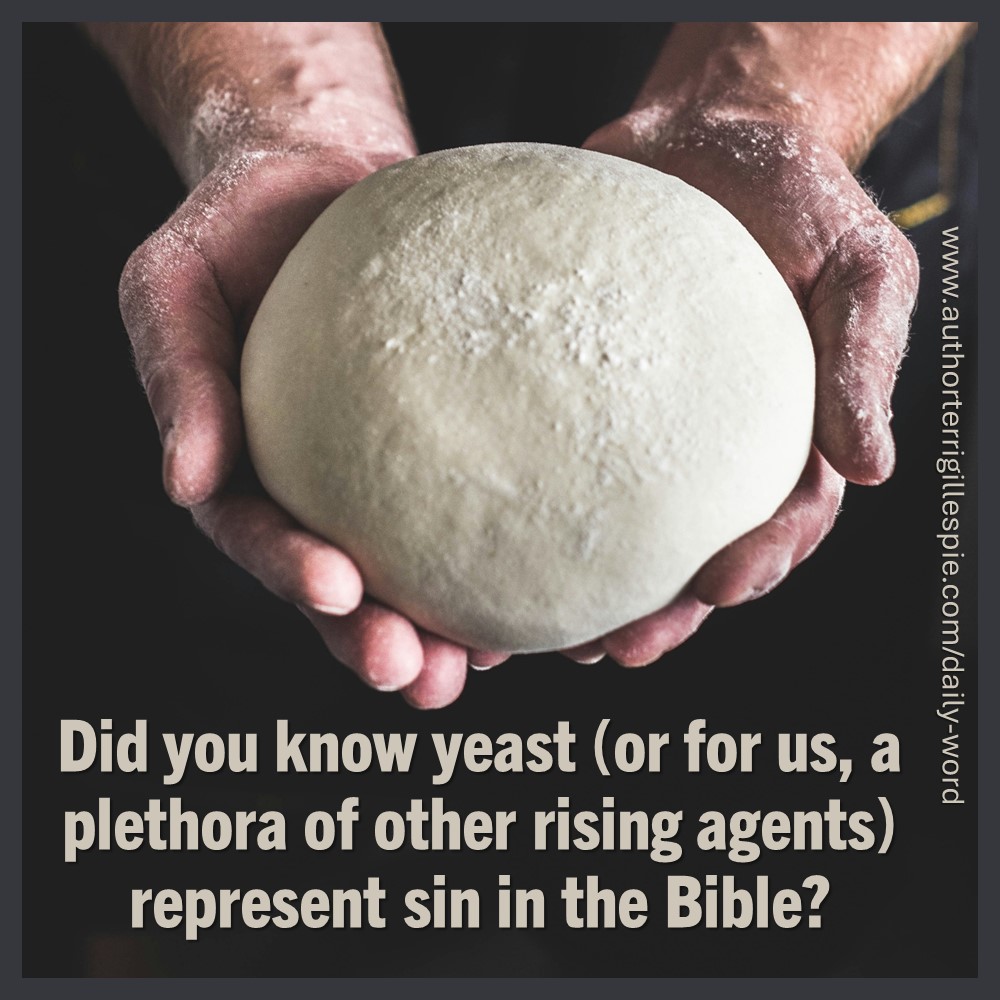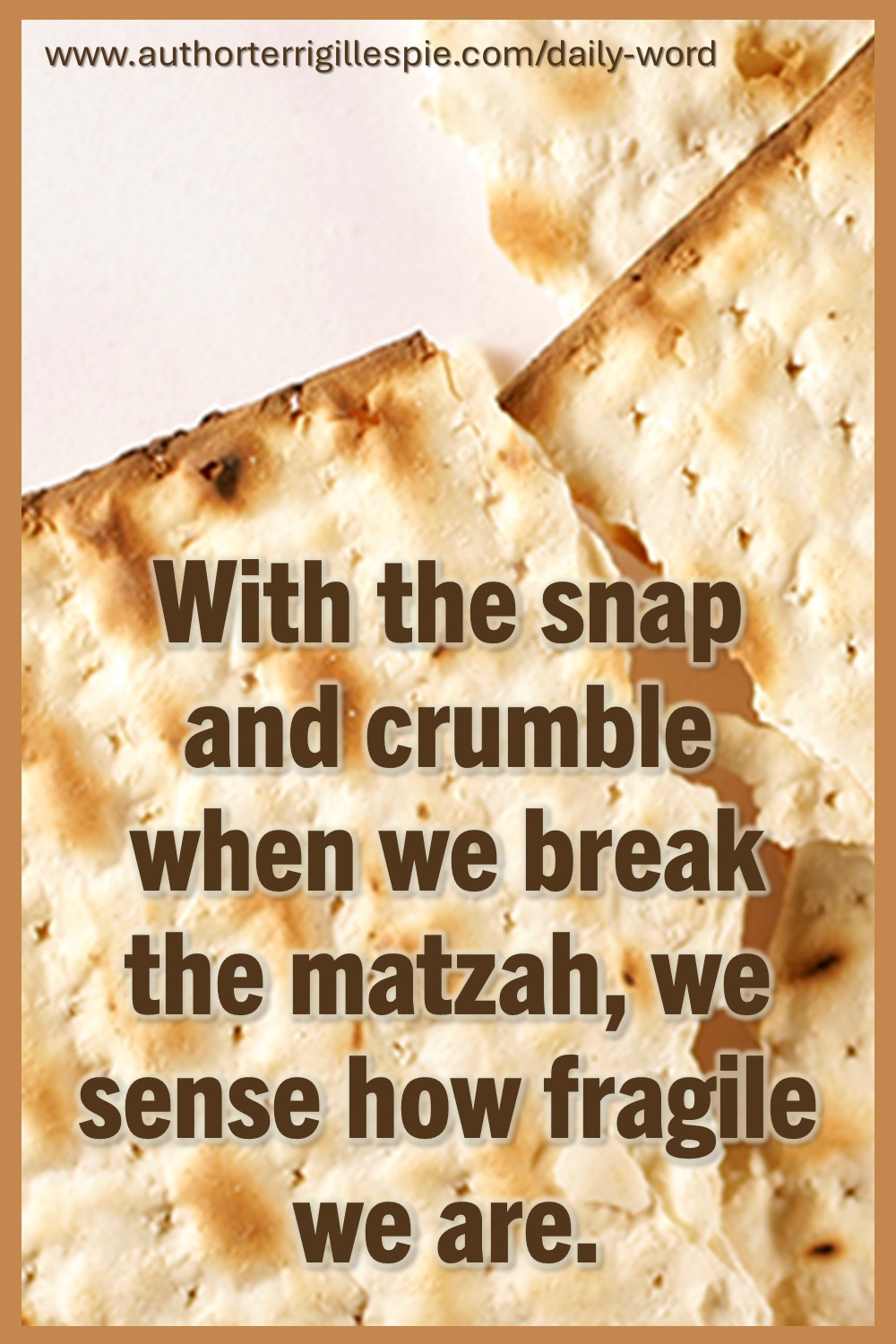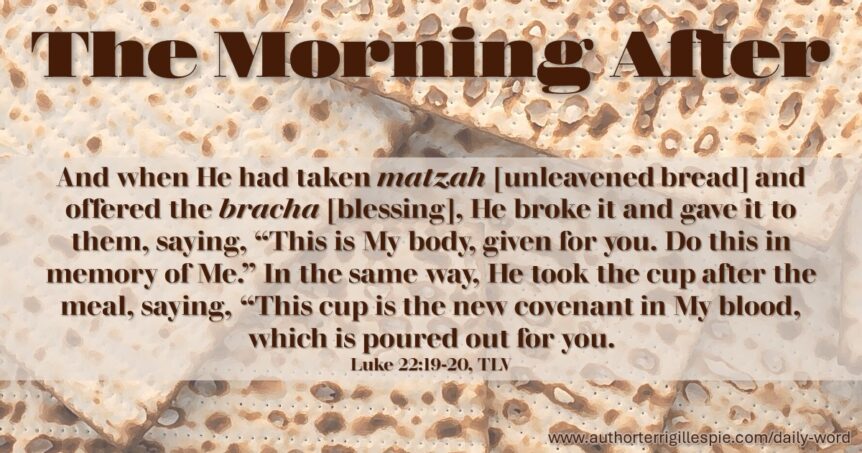And when He had taken matzah [unleavened bread] and offered the bracha [blessing], He broke it and gave it to them, saying, “This is My body, given for you. Do this in memory of Me.” In the same way, He took the cup after the meal, saying, “This cup is the new covenant in My blood, which is poured out for you. Luke 22:19-20, TLV
 The Morning After. If you’ve ever celebrated a full Passover Seder, trying to unpack the symbolism and prophetic fulfillment would take a lifetime. Our family has celebrated for nearly thirty years and every year the Holy Spirit will reveal another insight or remind us of an important truth. Have you experienced that?
The Morning After. If you’ve ever celebrated a full Passover Seder, trying to unpack the symbolism and prophetic fulfillment would take a lifetime. Our family has celebrated for nearly thirty years and every year the Holy Spirit will reveal another insight or remind us of an important truth. Have you experienced that?
Never celebrated a Passover Seder? Did you know that the “Last Supper” was a Passover Seder? It would be the last Passover meal Jesus would celebrate with His disciples on earth, but it wasn’t the last Passover. The disciples continued to celebrate it as commanded by God, long after Yeshua ascended into heaven. And today, Jewish people—especially believers in their Messiah—do the same.
Why? Well, as I said, it was commanded.
“These are the appointed feasts of ADONAI [the LORD], holy convocations which you are to proclaim in their appointed season. During the first month, on the fourteenth day of the month in the evening, is ADONAI’s Passover. On the fifteenth day of the same month is the Feast of Matzot to ADONAI. For seven days you are to eat matzah. Leviticus 23:4-6, TLV
Get rid of the old hametz [leaven], so you may be a new batch, just as you are unleavened—for Messiah, our Passover Lamb, has been sacrificed. 1 Corinthians 5:7, TLV
Did you know yeast (or for us, a plethora of other rising agents)  represent sin in the Bible? The Levites were not allowed to use leavened bread for the tabernacle and temple sacrifices. The matzah—the unleavened bread—carried powerful insights into the life of a follower of the GOD of Abraham, Isaac, and Jacob and His Only Son.
represent sin in the Bible? The Levites were not allowed to use leavened bread for the tabernacle and temple sacrifices. The matzah—the unleavened bread—carried powerful insights into the life of a follower of the GOD of Abraham, Isaac, and Jacob and His Only Son.
Your boasting is no good. Don’t you know that a little hametz leavens the whole batch of dough? 1 Corinthians 5:6, TLV
These Biblical appointed days and times (Leviticus 23) are meant to be physical reminders of the mercy and love and grace of our Heavenly Father and are prophetic insights into the coming and return of the Messiah.
 With the snap and crumble when we break the matzah, we sense how fragile we are. When we sip the juice, we rejoice that our names are written in the Lamb’s Book of Life (Revelation 20: 15). These simple symbols are tiny understandings and help us build gratitude and awe.
With the snap and crumble when we break the matzah, we sense how fragile we are. When we sip the juice, we rejoice that our names are written in the Lamb’s Book of Life (Revelation 20: 15). These simple symbols are tiny understandings and help us build gratitude and awe.
Last night was Erev Pesach—the first evening of Passover. The completion of 2024 Passover is April 30th. So, that means there are still a few days remaining with the Feast of Unleavened Bread. If you’ve never celebrated, read the book of Exodus—not in one day, of course—over the next few weeks. It helped me understand the backstory of the life of the Jewish people while in bondage and out. You’ll no doubt notice the prophetic symbolisms of our Messiah and our release from the bondage of sin.
A wonderful, simple way to celebrate Passover is covered in a great book, God’s Appointed Times by Barney Kasdan. (see link below)
Chag Pesach Semeach! Happy and joyful Passover.
LINK: https://www.amazon.com/Gods-Appointed-Times-New-Understanding/dp/1880226359



